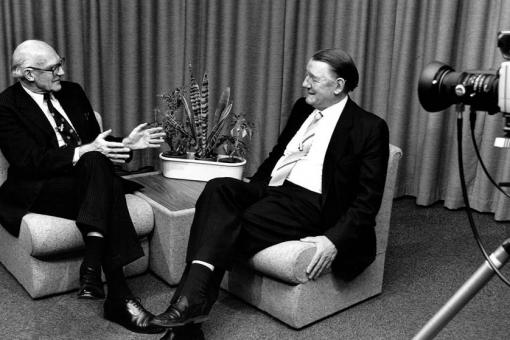The Medical Sciences Video Archive is a new resource hosted online by Oxford Brookes University. It opens up oral history video interviews with leading figures in 20th-century medicine.
Former Harveian librarian Sir Gordon Wolstenholme (1913–2004) opened his correspondence with four Royal College of Physicians (RCP) fellows in February 1985, inviting them to participate in a new venture:
"I have for a long time wanted to establish at the College an archive of video recordings ... with eminent and interesting Fellows, and at last there appears to be an excellent possibility of arranging such interviews."

The ‘excellent possibility’ he wrote of was a collaboration between Oxford Polytechnic (now Oxford Brookes University) and the RCP which would result in the recording of video interviews with over 130 important figures in clinical medicine and science over a 17-year period. Thanks to a grant from the Wellcome Trust, Oxford Brookes has now digitised these recordings and made them available through its online digital repository, RADAR .
The collection is an important and fascinating addition to the oral history of the medical world. Interviewees include Sir Douglas Black (1913–2002), Dame Margaret Turner-Warwick (1924–2017) and David Pyke (1921–2001), who played key roles in the running of the RCP, and others such as Dame Cicely Saunders (1918–2005), Dame Sheila Sherlock (1918–2001) and Archibald Cochrane (1909–1988), who speak of their involvement in major medical developments. Each record contains a short interview summary and description, including key words, and a facility to download the full videos or watch them online. Many also include fuller finding aids such as transcripts, and there are plans to add further documentation, including more interactive transcripts, in the near future.
The majority of the interviews were conducted by Max Blythe of Oxford Brookes University, a major figure in the project. Others were done by Wolstenholme and his successor to the Harveian librarian post, Sir Christopher Booth (1924–2012), and much of their correspondence with potential interviewees survives in the RCP archives.
"Potentially it will form a marvellous video ‘inventory’ of medical postage stamps."
Response from an interviewee on being invited to participate in the archive
This correspondence suggests that interviewees had a mixed reaction to the invitation to take part. ‘I’m honoured to be included in your "hit list" – although the implied onset of mortality takes the gilt off the gingerbread!’ writes one, echoing a common joke of oral history contributors that they have only been asked to participate because of their potentially imminent demise!
Others were overwhelmingly positive: ‘I am very enthusiastic about the project, as potentially it will form a marvellous video "inventory" of medical postage stamps,’ writes another.
Some refused outright, often citing their uncertain memory as a reason for doing so: ‘Much as I feel embarrassed at declining an invitation from you I feel that I have to ask to be excused from accepting this. The reason is that my memory is going off.’ A fairly large number of those approached refused to take part on these grounds, suggesting, perhaps, that accuracy of recall in such a process is particularly important to those from a scientific background.
Some of the words and expressions used by both Wolstenholme and the potential interviewees in their letters also suggest that, at this time, giving an hour-long video interview for an institution’s archives was something unusual, and made even the high-profile participants somewhat uneasy. They often refer to the interviews as ‘an ordeal’ to which they are ‘submitting’, words which slightly echo the use of the expression ‘hit list’ in the above quote. Post-interview correspondence, however, usually suggests that the sessions were very positive and friendly, whatever the initial misgivings.
Some letters give a hint of the potentially fascinating contents of the recordings. Correspondence between Sir George Godber and Sir Christopher Booth in 1992 gives a tantalising hint of Godber’s stories about the establishment of the National Health Service:
"I’ll be happy to help if I can, and I suppose there’s no one else left on either side from the original teams of planners and negotiators. You may recall the surveys of hospitals of 1943/4 and I think I’m the only surveyor left."
The videos that I have watched have, indeed, been gripping, with particular highlights being Raymond Hoffenberg (1923–2007) talking of his work in South Africa and subsequent exile, Archibald Cochrane recalling his experiences as a POW during the Second World War and the medical trials he carried out in the camps, and Cicely Saunders recalling her work establishing the hospice movement. It’s a wonderful development that, through the support of the Wellcome and the hard work of colleagues at Oxford Brookes University, these compelling stories are now accessible online.
Sarah Lowry, oral history project officer
Read our weekly library, archive and museum blog to learn more about the RCP’s collections, and follow us on Twitter, Instagram and Facebook.
